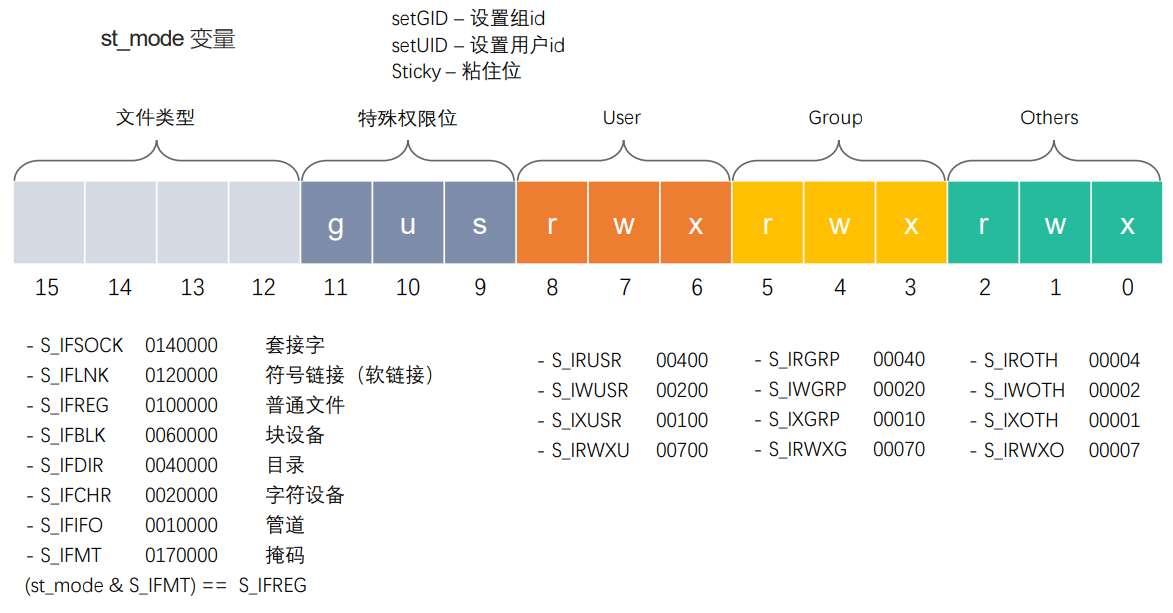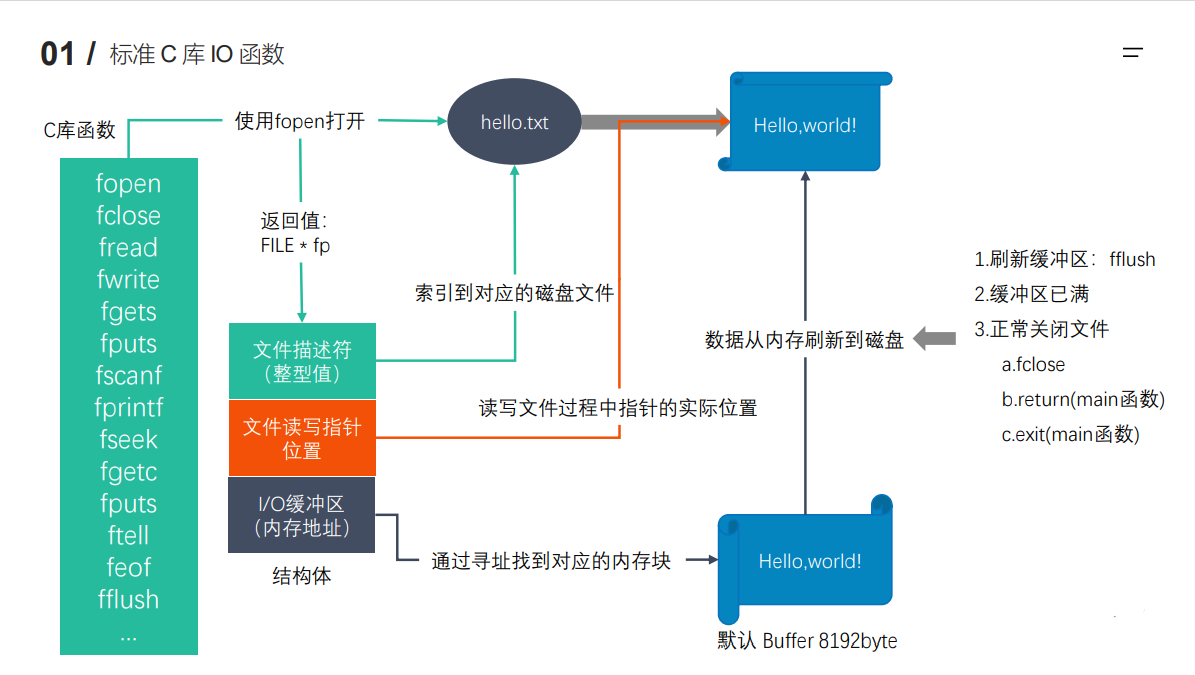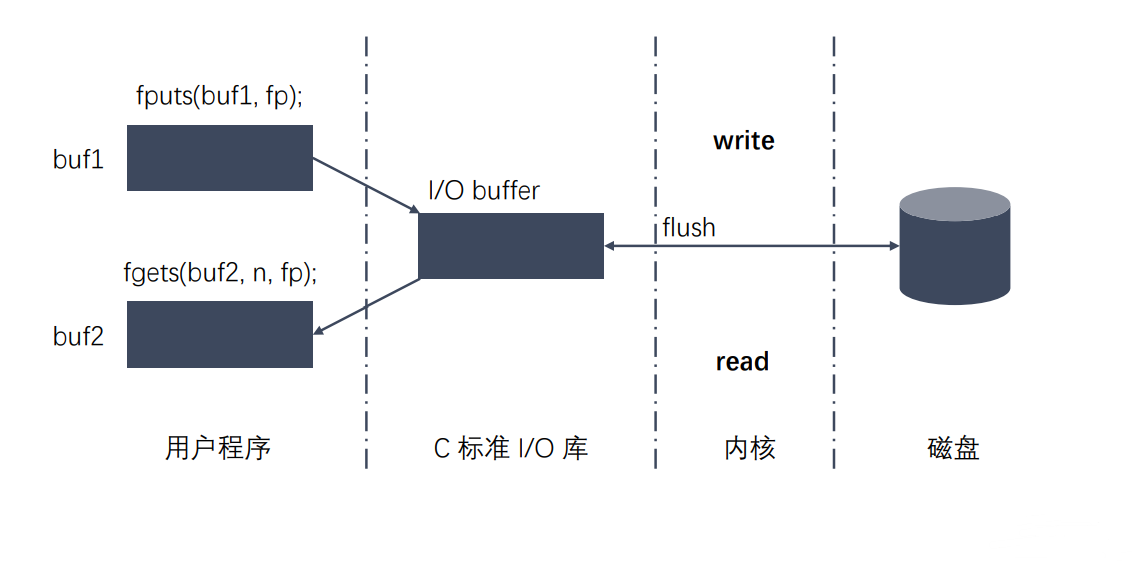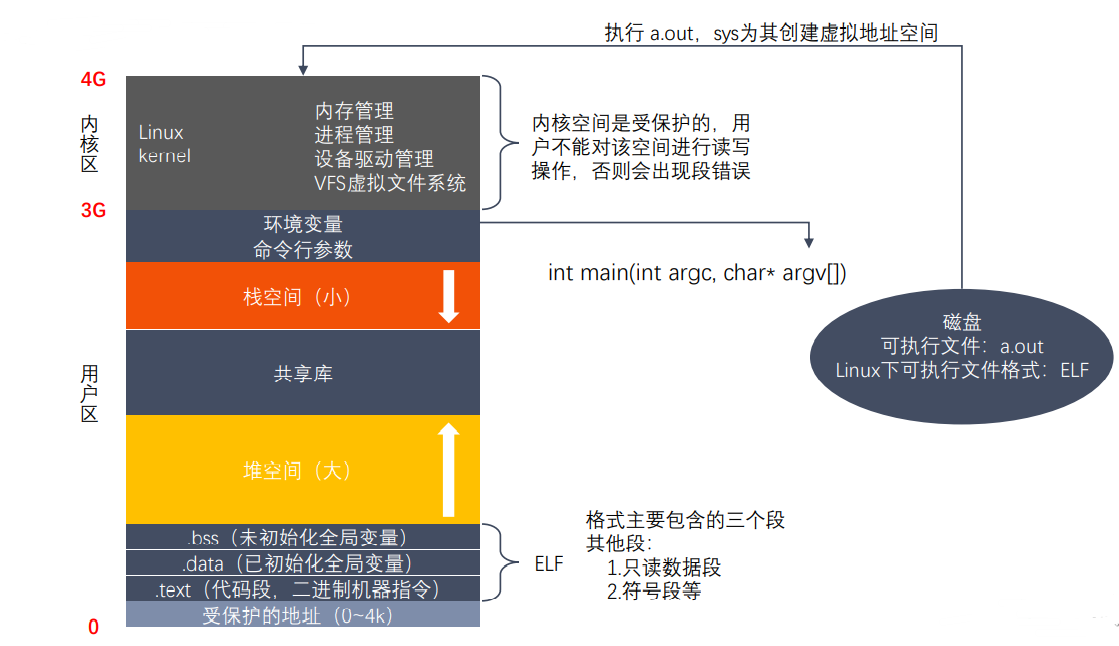本文最后更新于:2021年3月7日 晚上
概览:Linux IO
errno与输出
errno:属于Linux系统函数库,库里面的一个全局变量,记录的是最近的错误号。
可以通过函数perror(const char* s)来打印对应的错误描述。
1
2
3
4
| #include <stdio.h>
void perror(const char *s);
|
open函数1
1
2
3
4
5
6
| #include <sys/types.h>
#include <sys/stat.h>
#include <fcntl.h>
int open(const char *pathname, int flags);
|
参数:
- pathname:要打开的文件路径
- flags:对文件的操作权限设置还有其他的设置
- O_RDONLY, O_WRONLY, O_RDWR 这三个设置是互斥的
- 返回值:返回一个新的文件描述符,如果调用失败,返回-1
- 详细的可通过 man 2 open查看。
1
2
3
4
5
6
7
8
9
10
11
12
13
14
15
16
17
18
19
20
| #include <sys/types.h>
#include <sys/stat.h>
#include <fcntl.h>
#include <stdio.h>
#include <unistd.h> //close函数需要使用
int main(){
int fd = open("a.txt",O_RDONLY);
if(fd == -1){
perror("open a.txt");
}
close(fd);
return 0;
}
|
open函数2
1
2
3
4
5
| #include <sys/types.h>
#include <sys/stat.h>
#include <fcntl.h>
int open(const char *pathname, int flags, mode_t mode);
|
参数:
- pathname:要创建的文件的路径
- flags:对文件的操作权限和其他的设置
- 必选项:O_RDONLY, O_WRONLY, O_RDWR 这三个之间是互斥的
- 可选项:O_CREAT 文件不存在,创建新文件,
- 可选项:O_APPEND,追加文件内容
- 可选项:O_TRUNC,文件截断
- 可选项:O_NONBLOCK,设置非阻塞。
- mode:八进制的数,表示创建出的新的文件的操作权限,比如:
0775
- 最终的权限是:mode & ~umask
- umask的作用就是抹去某些权限,一般情况下是
0002,可直接在终端输入umask查看,也有相关函数可修改其值,可通过man来查看。
- 例如 0777 & ~(0002) = 0775。这样文件的权限775,则文件的权限为
rwxrwxr-x。
1
2
3
4
5
6
7
8
9
10
11
12
13
14
15
16
17
18
19
20
| #include <sys/types.h>
#include <sys/stat.h>
#include <fcntl.h>
#include <stdio.h>
#include <unistd.h>
int main(){
int fd = open("create.txt", O_RDWR | O_CREAT, 0777);
if(fd == -1){
perror("create file");
}
close(fd);
return 0;
}
|
read、write函数
1
2
3
| #include <unistd.h>
ssize_t read(int fd, void *buf, size_t count);
|
参数:
1
2
3
| #include <unistd.h>
ssize_t write(int fd, const void *buf, size_t count);
|
- 参数:
- fd:文件描述符,open得到的,通过这个文件描述符操作某个文件
- buf:要往磁盘写入的数据,数据
- count:要写的数据的实际的大小
- 返回值:
- 成功:实际写入的字节数
- 失败:返回-1,并设置errno
拷贝文件案例
1
2
3
4
5
6
7
8
9
10
11
12
13
14
15
16
17
18
19
20
21
22
23
24
25
26
27
28
29
30
31
32
33
34
35
| #include <sys/types.h>
#include <sys/stat.h>
#include <fcntl.h>
#include <unistd.h>
#include <stdio.h>
int main(){
int srcfd = open("english.txt",O_RDONLY);
if(srcfd == -1){
perror("open 1");
return -1;
}
int destfd = open("copy.txt",O_WRONLY|O_CREAT,0777);
if(destfd == -1){
perror("open 2");
return -1;
}
char buffer[1024] = {0};
int len = 0;
while((len = read(srcfd,buffer,sizeof(buffer))) > 0){
write(destfd,buffer,len);
}
close(destfd);
close(srcfd);
return 0;
}
|
lseek函数
1
2
3
4
5
6
7
8
|
#include <stdio.h>
int fseek(FILE *stream, long offset, int whence);
#include <sys/types.h>
#include <unistd.h>
off_t lseek(int fd, off_t offset, int whence);
|
参数:
whence:
- SEEK_SET 设置文件指针的偏移量
- SEEK_CUR 设置偏移量:当前位置 + 第二个参数offset的值
- SEEK_END 设置偏移量:文件大小 + 第二个参数offset的值
返回值:返回文件指针的位置
作用:
1.移动文件指针到文件头
1
| lseek(fd, 0, SEEK_SET);
|
2.获取当前文件指针的位置
1
| off_t off = lseek(fd, 0, SEEK_CUR);
|
3.获取文件长度
1
| off_t len = lseek(fd, 0, SEEK_END);
|
4.拓展文件的长度,当前文件10b, 110b, 增加了100个字节
1
2
| lseek(fd, 100, SEEK_END)
|
应用举例:
1
2
3
4
5
6
7
8
9
10
11
12
13
14
15
16
17
18
19
20
21
22
23
24
25
26
27
28
29
30
| #include <sys/types.h>
#include <sys/stat.h>
#include <fcntl.h>
#include <unistd.h>
#include <stdio.h>
int main(){
int fd = open("file.txt",O_RDWR);
if(fd ==-1){
perror("open");
return -1;
}
off_t lens = lseek(fd,0,SEEK_END);
printf("file.txt length: %ld \n",lens);
lseek(fd,100,SEEK_END);
write(fd," ",1);
close(fd);
return 0;
}
|
stat、lstat函数
1
2
3
4
5
6
7
8
9
10
11
12
13
14
15
16
17
18
19
20
21
22
23
24
25
| #include <sys/types.h>
#include <sys/stat.h>
#include <unistd.h>
int stat(const char *pathname, struct stat *statbuf);
int lstat(const char *pathname, struct stat *statbuf);
struct stat {
dev_t st_dev;
ino_t st_ino;
mode_t st_mode;
nlink_t st_nlink;
uid_t st_uid;
gid_t st_gid;
dev_t st_rdev;
off_t st_size;
blksize_t st_blksize;
blkcnt_t st_blocks;
time_t st_atime;
time_t st_mtime;
time_t st_ctime;
};
|
参数:
- pathname:操作的文件的路径
- statbuf:结构体变量,传出参数,用于保存获取到的文件的信息
- 返回值:
stat查看文件信息也可以通过在终端中使用stat来查看。
1
2
3
4
5
6
7
8
9
| colourso@c:~/桌面/ch1linux/09io$ stat file.txt
文件:file.txt
大小:111 块:8 IO 块:4096 普通文件
设备:801h/2049d Inode:807444 硬链接:1
权限:(0664/-rw-rw-r--) Uid:( 1000/colourso) Gid:( 1000/colourso)
最近访问:2021-03-05 15:40:28.434659770 +0800
最近更改:2021-03-05 15:45:56.297896243 +0800
最近改动:2021-03-05 15:45:56.297896243 +0800
创建时间:-
|
实例:
1
2
3
4
5
6
7
8
9
10
11
12
13
14
15
16
17
18
19
| #include <sys/types.h>
#include <sys/stat.h>
#include <unistd.h>
#include <stdio.h>
int main(){
struct stat statbuf;
int ret = stat("file.txt",&statbuf);
if(ret == -1){
perror("stat");
return -1;
}
printf("file.txt size: %ld\n",statbuf.st_size);
return 0;
}
|
案例:模仿ls -l命令查看文件信息
st_mode变量:文件的类型和存取的权限.- 下图中的数字均为8进制。

1
2
3
4
5
6
7
8
9
10
11
12
13
14
15
16
17
18
19
20
21
22
23
24
25
26
27
28
29
30
31
32
33
34
35
36
37
38
39
40
41
42
43
44
45
46
47
48
49
50
51
52
53
54
55
56
57
58
59
60
61
62
63
64
65
66
67
68
69
70
71
72
73
74
75
76
77
78
79
80
81
82
83
84
85
86
87
88
89
90
91
92
93
94
95
96
97
98
| #include <stdio.h>
#include <sys/types.h>
#include <sys/stat.h>
#include <unistd.h>
#include <pwd.h>
#include <grp.h>
#include <time.h>
#include <string.h>
int main(int argc, char * argv[]) {
if(argc < 2) {
printf("%s filename\n", argv[0]);
return -1;
}
struct stat st;
int ret = stat(argv[1], &st);
if(ret == -1) {
perror("stat");
return -1;
}
char perms[11] = {0};
switch(st.st_mode & S_IFMT) {
case S_IFLNK:
perms[0] = 'l';
break;
case S_IFDIR:
perms[0] = 'd';
break;
case S_IFREG:
perms[0] = '-';
break;
case S_IFBLK:
perms[0] = 'b';
break;
case S_IFCHR:
perms[0] = 'c';
break;
case S_IFSOCK:
perms[0] = 's';
break;
case S_IFIFO:
perms[0] = 'p';
break;
default:
perms[0] = '?';
break;
}
perms[1] = (st.st_mode & S_IRUSR) ? 'r' : '-';
perms[2] = (st.st_mode & S_IWUSR) ? 'w' : '-';
perms[3] = (st.st_mode & S_IXUSR) ? 'x' : '-';
perms[4] = (st.st_mode & S_IRGRP) ? 'r' : '-';
perms[5] = (st.st_mode & S_IWGRP) ? 'w' : '-';
perms[6] = (st.st_mode & S_IXGRP) ? 'x' : '-';
perms[7] = (st.st_mode & S_IROTH) ? 'r' : '-';
perms[8] = (st.st_mode & S_IWOTH) ? 'w' : '-';
perms[9] = (st.st_mode & S_IXOTH) ? 'x' : '-';
int linkNum = st.st_nlink;
char * fileUser = getpwuid(st.st_uid)->pw_name;
char * fileGrp = getgrgid(st.st_gid)->gr_name;
long int fileSize = st.st_size;
char * time = ctime(&st.st_mtime);
char mtime[512] = {0};
strncpy(mtime, time, strlen(time) - 1);
char buf[1024];
sprintf(buf, "%s %d %s %s %ld %s %s", perms, linkNum, fileUser, fileGrp, fileSize, mtime, argv[1]);
printf("%s\n", buf);
return 0;
}
|
使用:
1
2
3
4
5
6
7
| colourso@c:~/桌面/ch1linux/09io$ gcc -o myls ls-l.c
colourso@c:~/桌面/ch1linux/09io$ ./myls
./myls filename
colourso@c:~/桌面/ch1linux/09io$ ./myls file.txt
-rw-rw-r-- 1 colourso colourso 111 Fri Mar 5 15:45:56 2021 file.txt
colourso@c:~/桌面/ch1linux/09io$ ls -l file.txt
-rw-rw-r-- 1 colourso colourso 111 3月 5 15:45 file.txt
|
文件属性操作函数
1
2
3
4
5
6
7
8
9
10
11
12
13
14
15
16
17
18
19
20
21
22
23
24
25
26
27
28
29
30
31
32
33
34
35
36
37
38
| #include <unistd.h>
int access(const char *pathname, int mode);
#include <sys/stat.h>
int chmod(const char *pathname, mode_t mode);
#include <unistd.h>
#include <sys/types.h>
int truncate(const char *path, off_t length);
|
案例:
1
2
3
4
5
6
7
8
9
10
11
12
13
14
15
16
17
18
19
20
21
22
23
24
25
26
27
28
29
30
31
32
33
34
35
36
37
38
39
40
41
42
43
44
45
46
47
48
49
50
51
52
53
54
55
56
57
| #include <unistd.h>
#include <stdio.h>
#include <sys/types.h>
#include <sys/stat.h>
int main(){
int ret = access("a.txt",F_OK);
if(ret == -1){
perror("access");
return -1;
}
printf("a.txt is exit!\n");
ret = chmod("a.txt",0777);
if(ret == -1){
perror("chmod");
return -1;
}
printf("chmod success\n");
struct stat st;
ret = stat("a.txt",&st);
if(ret == -1){
perror("stat1");
return -1;
}
printf("a.txt size is %ld\n",st.st_size);
ret = truncate("a.txt",20);
if(ret == -1){
perror("truncate");
return -1;
}
ret = stat("a.txt",&st);
if(ret == -1){
perror("stat2");
return -1;
}
printf("a.txt size is %ld\n",st.st_size);
return 0;
}
|
除此之外:
/etc/passwd下存储了许多的用户名、uid所在组等信息/etc/group下存储了许多的组、gid等信息
目录操作函数
1
2
3
4
5
6
7
8
9
10
11
12
13
14
15
16
17
18
19
20
21
22
23
24
25
26
27
28
29
30
31
32
33
34
35
36
37
38
39
40
41
42
43
44
45
46
47
48
| #include <sys/stat.h>
#include <sys/types.h>
int mkdir(const char *pathname, mode_t mode);
#include <sys/stat.h>
#include <sys/types.h>
int rmdir(const char *pathname);
#include <stdio.h>
int rename(const char *oldpath, const char *newpath);
#include <unistd.h>
int chdir(const char *path);
#include <unistd.h>
char *getcwd(char *buf, size_t size);
|
实例:
1
2
3
4
5
6
7
8
9
10
11
12
13
14
15
16
17
18
19
20
21
22
23
24
25
26
27
28
29
30
31
32
33
34
35
36
37
38
39
40
41
42
43
44
45
46
47
48
| #include <sys/stat.h>
#include <sys/types.h>
#include <fcntl.h>
#include <unistd.h>
#include <stdio.h>
int main(){
char buf[128];
getcwd(buf,sizeof(buf));
printf("now work path: %s\n",buf);
int ret = chdir("/home/colourso/桌面/ch1linux/09io");
if(ret == -1){
perror("chdir");
return -1;
}
char buf1[128];
getcwd(buf1,sizeof(buf1));
printf("now work path: %s\n",buf1);
ret = mkdir("dir1",0777);
if(ret == -1){
perror("mkdir");
return -1;
}
printf("dir1 create success\n");
ret = rename("dir1","dir2");
if(ret == -1){
perror("rename");
return -1;
}
printf("dir1 rename dir2\n");
return 0;
}
|
目录遍历函数
1
2
3
4
5
6
7
8
9
10
11
12
13
14
15
16
17
18
19
20
21
22
23
24
25
26
27
28
|
#include <sys/types.h>
#include <dirent.h>
DIR *opendir(const char *name);
#include <dirent.h>
struct dirent *readdir(DIR *dirp);
#include <sys/types.h>
#include <dirent.h>
int closedir(DIR *dirp);
|
struct dirent结构体:
1
2
3
4
5
6
7
8
9
10
11
12
13
14
15
16
17
18
19
20
21
22
23
| struct dirent
{
ino_t d_ino;
off_t d_off;
unsigned short int d_reclen;
unsigned char d_type;
char d_name[256];
};
d_type
DT_BLK - 块设备
DT_CHR - 字符设备
DT_DIR - 目录
DT_LNK - 软连接
DT_FIFO - 管道
DT_REG - 普通文件
DT_SOCK - 套接字
DT_UNKNOWN - 未知
|
案例:读取某个目录下所有普通文件个数
1
2
3
4
5
6
7
8
9
10
11
12
13
14
15
16
17
18
19
20
21
22
23
24
25
26
27
28
29
30
31
32
33
34
35
36
37
38
39
40
41
42
43
44
45
46
47
48
49
50
51
52
53
54
55
56
57
58
59
60
61
62
63
64
65
66
| #include <sys/types.h>
#include <dirent.h>
#include <stdio.h>
#include <string.h>
#include <stdlib.h>
int getFileNum(const char* path){
DIR* dir = opendir(path);
if(dir == NULL){
perror("opendir");
exit(0);
}
int total = 0;
struct dirent *dirp = NULL;
while((dirp = readdir(dir)) != NULL){
if(dirp->d_type == DT_DIR){
char * dirname = dirp->d_name;
if(strcmp(dirname,".") == 0 || strcpy(dirname,"..") == 0){
continue;
}
char pathname[256];
sprintf(pathname,"%s/%s",path,dirname);
total += getFileNum(pathname);
}
if(dirp->d_type == DT_REG){
total++;
}
}
closedir(dir);
return total;
}
int main(int argc,char * argv[]){
if(argc <2){
printf("%s path\n",argv[0]);
exit(0);
}
int num = getFileNum(argv[1]);
printf("普通文件个数为%d\n",num);
return 0;
}
|
dup、dup2函数
1
2
3
4
5
6
7
8
9
10
11
12
13
14
15
16
17
18
| #include <unistd.h>
int dup(int oldfd);
#include <unistd.h>
int dup2(int oldfd, int newfd);
|
实例:
1
2
3
4
5
6
7
8
9
10
11
12
13
14
15
16
17
18
19
20
21
22
23
24
25
26
27
28
29
30
31
32
33
34
35
36
37
38
39
40
41
42
43
44
45
46
47
48
49
50
51
52
53
54
55
56
57
58
59
60
61
62
63
64
65
66
| #include <sys/types.h>
#include <sys/stat.h>
#include <fcntl.h>
#include <unistd.h>
#include <stdio.h>
#include <string.h>
int main(){
int fd = open("a.txt",O_RDWR);
if(fd == -1){
perror("open");
return -1;
}
int newfd = dup(fd);
if(newfd == -1){
perror("dup");
return -1;
}
printf("fd: %d,newfd: %d\n",fd,newfd);
close(fd);
char* buf = "hello world!";
write(newfd,buf,strlen(buf));
close(newfd);
int fd1 = open("1.txt",O_RDWR|O_CREAT,0664);
int fd2 = open("2.txt",O_RDWR|O_CREAT,0664);
if(fd1 == -1 || fd2 == -1){
perror("open2");
return -1;
}
printf("fd1: %d,fd2: %d\n",fd1,fd2);
int fd3 = dup2(fd1,fd2);
if(fd3 == -1){
perror("dup2");
return -1;
}
printf("fd1: %d,fd2: %d,fd3: %d\n",fd1,fd2,fd3);
char *buffer1 = "hello world -- by fd1";
char *buffer2 = "hello world -- by fd2";
write(fd1,buffer1,strlen(buffer1));
write(fd2,buffer2,strlen(buffer2));
close(fd1);
close(fd3);
return 0;
}
|
执行结果:
1
2
3
4
| fd: 3,newfd: 4
fd1: 3,fd2: 4
fd1: 3,fd2: 4,fd3: 4
|
fctnl函数
1
2
3
4
5
6
7
8
9
10
11
12
13
14
15
16
17
18
19
20
21
22
| #include <unistd.h>
#include <fcntl.h>
int fcntl(int fd, int cmd, ...);
|
实例:
1
2
3
4
5
6
7
8
9
10
11
12
13
14
15
16
17
18
19
20
21
22
23
24
25
26
27
28
29
30
31
32
33
34
35
36
37
38
39
40
41
42
43
44
45
46
47
48
49
50
| #include <sys/types.h>
#include <sys/stat.h>
#include <fcntl.h>
#include <stdio.h>
#include <unistd.h>
#include <string.h>
int main(){
int fd = open("a.txt",O_RDWR);
if(fd == -1){
perror("open");
return -1;
}
int flag = fcntl(fd,F_GETFL);
if(flag == -1){
perror("fctnl");
return -1;
}
flag = flag | O_APPEND;
int ret = fcntl(fd,F_SETFL,flag);
if(ret == -1){
perror("fctnl2");
return -1;
}
char * buf = "\n你好世界";
ret = write(fd,buf,strlen(buf));
if(ret == -1){
perror("write");
return -1;
}
close(fd);
return 0;
}
|
标准库IO与Linux IO


一般情况下推荐使用标准库的io,在多平台容易同统一,并且标准IO库还有缓冲区的使用,效率比普通的系统IO高。
虚拟地址空间

上述是虚拟的32位的linux的虚拟空间。具体的细节可参看CSAPP。
linux每一个运行的程序:即进程。操作系统都会为其分配一个0-4G的地址空间,即虚拟地址空间。
文件描述符





